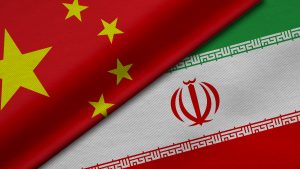Behind the smiles from Iranian and Chinese leaders in Beijing this week, there may well be frustration. Iranian President Ebrahim Raisi visited the Chinese capital with the hope of shoring up his country’s international support and extracting economic advantages from his country’s relationship with China. Meanwhile, Chinese President Xi Jinping wanted to use the visit to push for a resolution to the ongoing negotiations over Iran’s nuclear program. Unfortunately for both, neither are unlikely to get what they want.
For Raisi, it was important to show that Iran is not the international pariah that many in the West presume. Iran is also struggling economically; in addition to coping with the sanctions that were reimposed on the country after then-U.S. President Donald Trump withdrew the United States from the Joint Comprehensive Plan of Action (JCPOA), Iran’s economy has been sluggish, despite the apparent end of the pandemic. Inflation is high, at 40 percent, while GDP growth has been slowing, from 4.7 percent in 2021 to 3 percent in 2022 and a projected 2 percent this year, according to the IMF.
Raisi may have hoped that the visit to China would unlock more funds and investment. In 2021, the two countries signed a 25-year cooperation agreement. Although media reports suggested (with no reputable sourcing) that the investments involved would be substantial, worth up to $400 billion, there is little sign that is happening. In 2022, Chinese firms accounted for only $185 million, or 3 percent of total investments. Indeed, in recent years Russia has become a bigger investor in Iran than China. Instead, Raisi had to make do with Iran and China signing more agreements, around 20 in total, including on trade and tourism.
A return to the JCPOA, whereby sanctions are removed in exchange for Iran freezing its nuclear program, could be a helpful first step toward unlocking more Chinese investment. That may be what Xi was thinking when he implicitly blamed U.S. behavior for the current deadlock in talks. Certainly, the Chinese feel it should be the Americans who make the first move.
However, Xi’s words obscure potential difficulties that the Chinese may face. One is the imbalance in the relationship between the two countries. Economically, the current state of affairs benefits the Chinese more than Iran. This is especially notable when it comes to oil sales in the post-JCPOA period. Since the reimposition of sanctions, Iran’s ability to sell its primary export has become more limited. Increasingly, Iran has had to rely on Chinese purchases, which worked to China’s advantage by letting it purchase Iranian oil for cheaper than the global market price.
The disparity between the two has not gone unnoticed in Tehran. Not only do some in the regime fear becoming too dependent on China, but wider public opinion is also skeptical.
Another area of risk for Beijing is holding onto its current position over the JCPOA. While the Chinese are opposed to the proliferation of nuclear weapons, they continue to see the JCPOA as the principal tool to achieving this when it comes to Iran. But focusing on the JCPOA may turn out to be myopic for Beijing, especially if developments around Iran’s reactivated nuclear program cross a point of no return.
When the JCPOA was agreed in 2015, it was designed to contain Iran’s nuclear program, which was ostensibly a civilian one. The U.S. withdrawal from the agreement was not copied by any of the other signatories, including Iran itself. Presumably then, the agreement remained in force.
Yet Iran used the U.S. withdrawal as a green light to restart its production and the stockpiling of nuclear material. Tehran continued to do so even as it engaged in indirect dialogue with the Americans. By the end of last year Iran was approaching a threshold where it is suspected to have sufficient material to break out and produce a nuclear bomb.
Should Iran choose to produce a bomb or to sit on the knowledge that it can do so, a line will have been crossed; the negotiations and the deal itself will have become redundant. For China, as well as the rest of the international community, this will present a new test: How to handle a nuclear Iran.
At the same time, the implications of such a development would have repercussions beyond Iran and China’s relationship with it. Given the widespread suspicion among Iran’s neighbors, this could constitute a major transformation of regional politics, which would have implications for Beijing and its relations with those other countries.
Given that prospect, it is understandable why Xi would have wanted to support Iran by keeping the focus on the JCPOA. At the same time, there is little sign that Iran’s leadership sees a return to the nuclear deal as its principal concern. Consequently, there could be pain to come in the Sino-Iranian relationship.
































